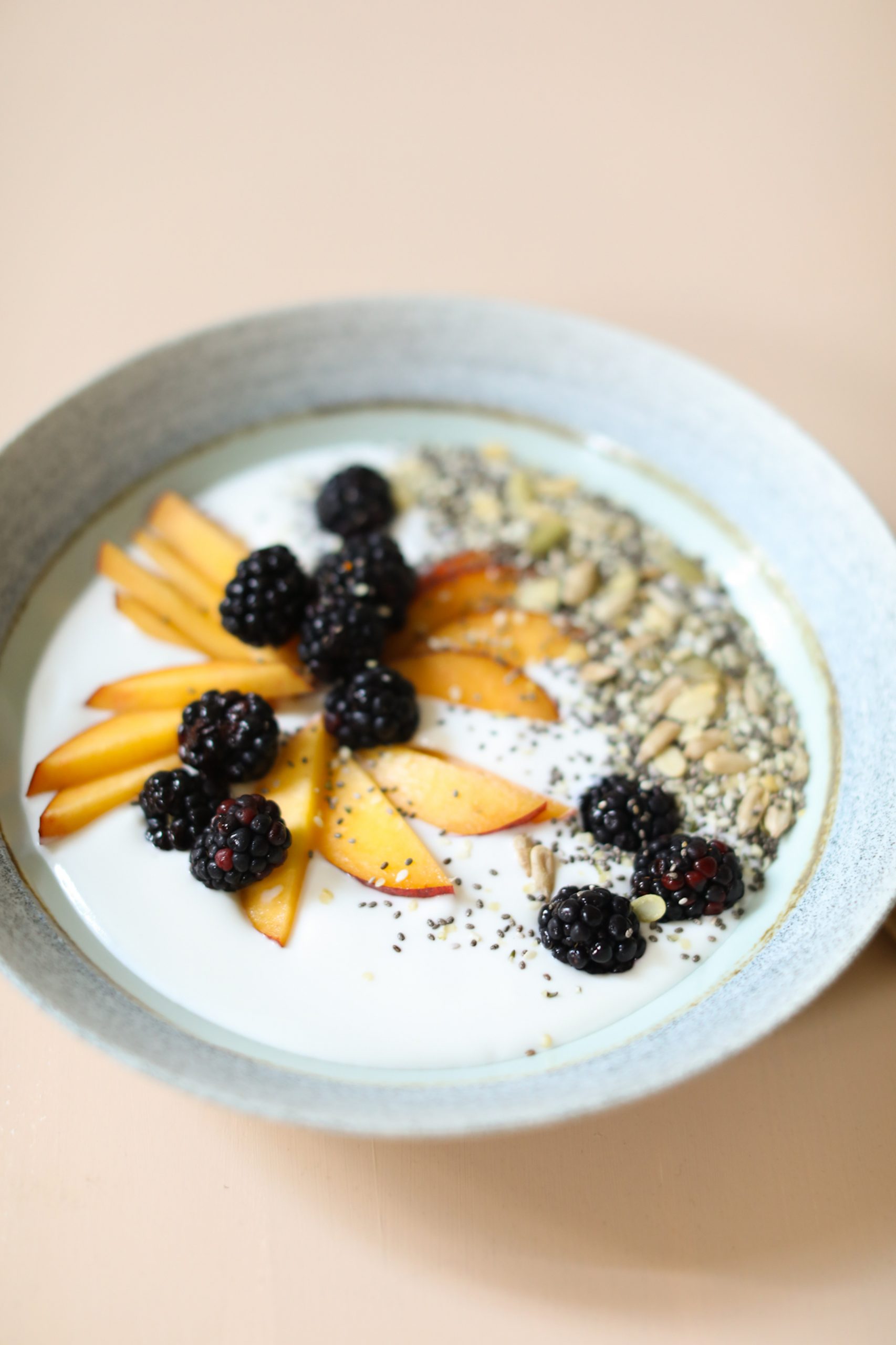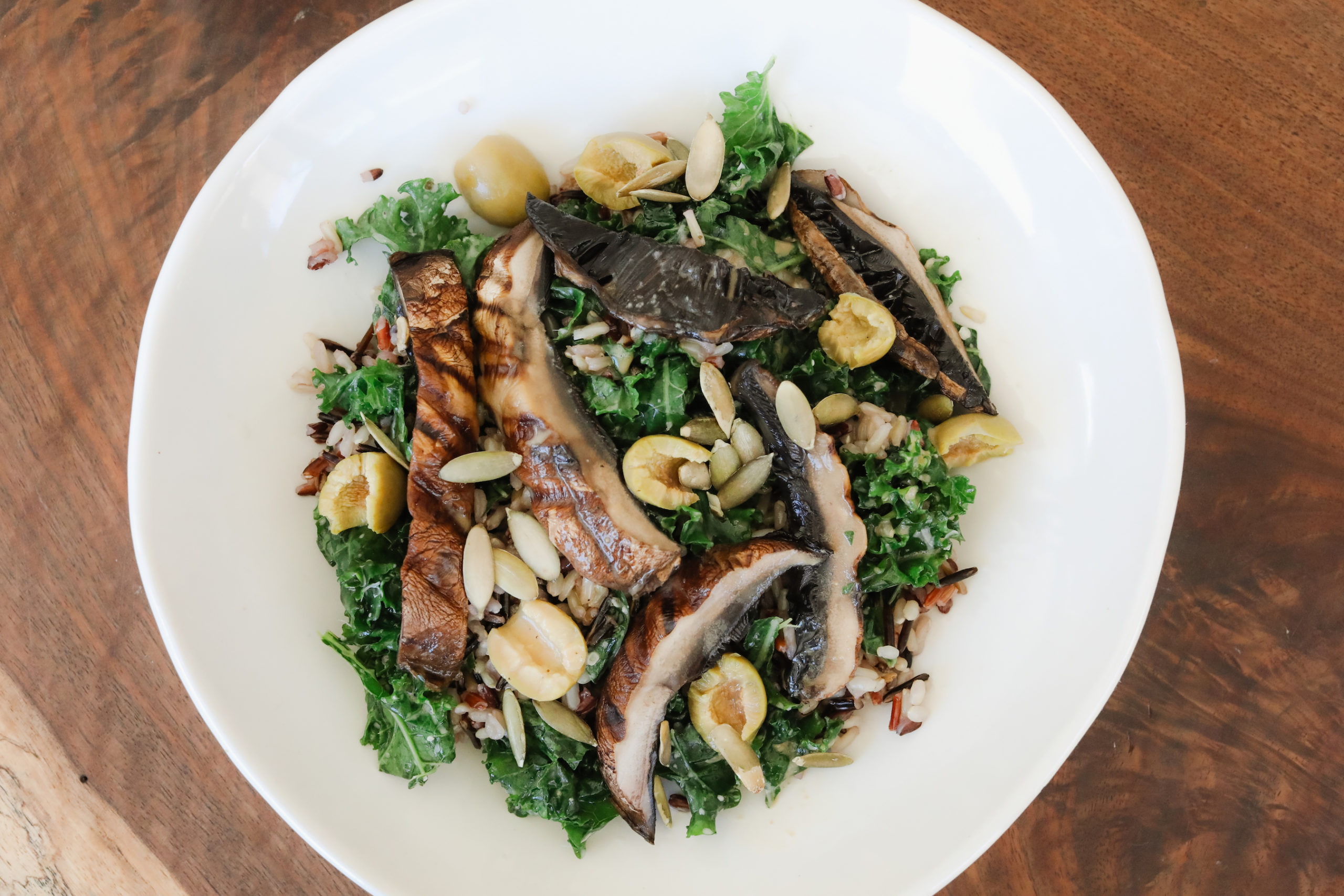Use these mindful eating journal prompts and reflection questions to assess your current relationship with food.
Mindful eating is all about finding what works for your unique body. It’s about tapping into your body’s cues, your personal wants, likes, and dislikes. It’s about getting to know your habits and tendencies in a compassionate way so you can make adjustments with ease.
What is Mindful Eating?
Here at Nutrition Stripped, we believe there are two important aspects of eating well every day: what you eat and how you eat. The concept of mindful eating is more about how to eat rather than what or how much you are eating. It’s all about putting the focus back on your experience at mealtimes.
Mindful eating is a practice that allows you to be more intentional with your eating habits while also maintaining a healthy relationship with food. Slowing down and bringing more mindful awareness to what you’re eating and how you’re feeling before, during, and after meals is one of the best practices you can have for finding what works for you and creating healthy eating habits.
The following mindful eating journal prompts will walk you through exactly how to reflect on your relationship with food so you can be more mindful.

10 Mindful Eating Journal Prompts and Reflection Questions
You can use these journal prompts and reflection questions to get to know yourself and your relationship with food a bit better. Use this knowledge to help build your mindful eating routines and positive relationship with food.
While engaging with these mindful eating journal prompts and reflection questions, don’t forget to do so with compassion. Don’t judge yourself or your answers, allow yourself to be candid and honest. This allows for growth and change.
You can engage with all of these prompts in one sitting, or you can pick one or two to engage with at a time. Whatever works best for you!
1. How would I describe my current relationship with food?
(i.e. balanced, imbalanced, negative, forced, easy, restrictive, tumultuous, normal, frustrating, controlling, easeful, fun, etc.)
In this first mindful eating journal prompt, reflect on your relationship with food. What words come to mind when you think about it? How would you describe it? This will help to set the scene for what we’re working with while engaging with the following prompts.
2. What do I enjoy about my current relationship with food?
(i.e. I’m able to eat what I enjoy while also physically nourishing myself, I never feel restricted, I don’t feel out of control around food, I enjoy nourishing myself, etc.)
Think through the positive components that you associate with your relationship with food here. What parts of your relationship are enjoyable? What do you like about it? Get really specific here.
2. What do I dislike about my current relationship with food?
(i.e. I’m not able to eat what I enjoy, I don’t know how to nourish myself, I often feel restricted, I feel out of control around food, I feel stressed about food, etc.)
Now think about what you may not enjoy about your current relationship with food. And remember, self-compassion is key here. No judgment allowed! Just let yourself mindfully reflect and assess. This particular mindful eating journal prompt can help you identify what you would like to change.
3. What does hunger feel like to me? What does satiety feel like to me?
(i.e. My stomach growls, food starts to sound good, I think about food more, I get a little brain fog, my stomach feels empty, my hands get a little shaky, etc.)
Now that we’ve working through some of the overarching themes, let’s work through some of the more specific parts of your relationship with food. While engaging with this journal prompt, it can be helpful to physically picture yourself the last time you felt hungry. Maybe it was earlier today, or last night, or even right now! Then start to walk through the feelings (both physical and mental), that you experience.
4. Do emotions ever impact my eating habits? If so, how?
(i.e. When I’m sad I turn to food, when I’m excited I never want to eat, when I’m stressed I eat past my hunger cues, when I’m stressed I ignore my hunger cues, when I’m overwhelmed I overeat, etc.)
Think through how your emotions impact your relationship with food. What kinds of emotions impact your choices? How often does it happen? What happens when you’re feeling that emotion and in need of food? The more awareness you have surrounding your emotions in relation to food, the easier it will be to change or sustain your actions at the moment as needed.
5. What food items do I enjoy eating?
(i.e. anything and everything you enjoy)
Remember, this is a judgment-free zone. Write down everything and anything you enjoy eating, whether that’s an enjoyment-based food or a more nourishment-based food. If you struggle to think of anything here, that lets you know that this area needs a bit of discovery and exploration!

6. What food items do I often crave?
(i.e. chocolate, peanut butter, pasta, leafy greens, green juice, candy, potatoes, etc.)
Think about the food items you crave often. Foods you enjoy and foods you crave are slightly different. Cravings are stronger and sometimes may even feel involuntary. By shining a light on your cravings, you can learn a lot about where those cravings are coming from and why you’re experiencing them.
7. Are there any food rules I abide by? If so, list them. Are these food rules rooted in balance? If not, how can I make them more balanced?
(i.e. I can’t eat past 7 pm, I can only have carbs during the first half of the day, I can’t have chocolate in the house, I have to have vegetables with every single meal, etc.)
You can learn a lot about your relationship with food by identifying any food rules that you abide by. Once you’ve listed out any food rules that you have (as shown in the example above), reflect on whether or not they’re balanced. If the feel strict and rigid rather than flexible and easeful, try and think through how you can remove the rule and change it into something more balanced.
8. Are there certain foods I consider to be, “good”, or, “bad”? If so, what are they? And why do I assign this morality to them?
(i.e. whole foods are good, starchy carbs are bad, candy is bad, ice cream is bad, vegetables are good, green juice is good, etc.)
When we label food as good or bad, we allow guilt and shame to come into our relationship with food. By identifying where and why morality plays a part in your relationship with food, you can start to remove it and practice more balance.
9. Do I feel confident in my relationship with food? If so, why? If not, why?
(i.e. yes, I nourish myself in a way that works well for me, no, I don’t know how to nourish myself without feeling overwhelmed, etc.)
Confidence is key for a mindful, balanced relationship with food. But sometimes we forget to check in with this! Take a moment to check in with your confidence level. Get to know where and why you do or don’t feel confident, so you can work to maintain that confidence or make a shift.
10. What would I like to change about my relationship with food? How will I go about doing this based on my answers to the questions above?
(i.e. I would like to remove morality from food, be more mindful at mealtimes, build my confidence, etc.)
Identify exactly what you would like to change and adjust after engaging with the previous questions in this reflection. Once identified, remember to do so with compassion and without haste. Take your time and remember, the goal is balance not perfection.
The Takeaway
Mindful reflection is one of the most powerful tools you can use to develop and maintain a balanced relationship with food. Use these mindful eating reflection questions time and time again to get to know yourself and your relationship with food even better!
Do You Want to Experience More Balance with your Food Choices?
Then find your balanced eating type!
Take this 45-second free quiz to find out which balanced eating archetype you are, and what your unique type needs to maintain balance with the way you nourish yourself. That way, you can finally be free from food and diet obsession, maintain a balanced weight, and cultivate a positive relationship with food and your body.
Take The Free Quiz Now
The post Mindful Eating Journal Prompts appeared first on Nutrition Stripped®.
McKel (Hill) Kooienga
Comments
Post a Comment